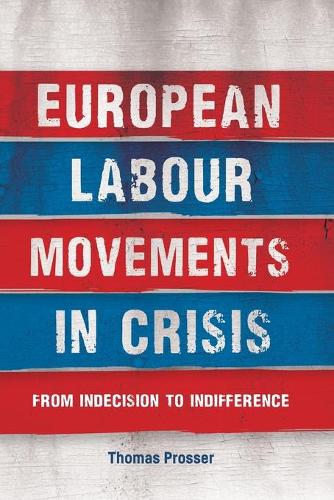
European Labour Movements in Crisis: From Indecision to Indifference
(Paperback)
Available Formats
Publishing Details
European Labour Movements in Crisis: From Indecision to Indifference
By (Author) Thomas Prosser
Manchester University Press
Manchester University Press
30th April 2020
United Kingdom
Classifications
Physical Properties
Paperback
208
Width 156mm, Height 234mm
Description
In this book, Prosser argues that labour movements respond to European integration in a manner which instigates competition between national labour markets. It bases its hypothesis on analysis of four countries - Germany, Spain, France and Poland - and two processes: the collective bargaining practices of trade unions in the first decade of the Eurozone and the response of trade unions and social-democratic parties to austerity in Southern Europe. In the first process, although unions did not intentionally compete, there was a drift towards zero-sum outcomes which benefited national workforces in stronger structural positions. In the second process, during which a crisis resulting from the earlier actions of labour occurred, lack of solidarity reinforced effects of competition. -- .
Reviews
'This book might well be a record of the last gasps of what may soon be a historical phenomenon. It is highly recommended reading for anyone who cares about social justice in general and labour in particular.'
Bob Hanck, Associate Professor of Political Economy at the London School of Economics and Political Science
'This important book examines how national trade unions shape competitive dynamics within and beyond the Eurozone. Based on extensive field work, the book shows convincingly how these processes contribute to a dualisation on a European scale, which could ultimately bring the Eurozone to the brink of collapse.'
Patrick Emmenegger, Professor of Comparative Political Economy and Public Policy at the University of St. Gallen
'Trade unions traditionally espouse doctrines of solidarity and cooperation; however, they often find themselves tied to national interests that send them in an opposite direction. Prossers approach enables him to demonstrate how things could be different. Prossers unflinching realism combined with a strong theoretical base means that he avoids both naive optimism and irredeemable pessimism.'
Colin Crouch, Professor Emeritus at the Warwick Business School and External Scientific Member at the Max Planck Institute for the Study of Societies
Supported by robust in-depth research in a number of European countries, this book not only provides a new, complex picture of centrifugal dynamics in European societies, but strong evidence that industrial relations do matter today for the better or worse.'
Guglielmo Meardi, Professor of Industrial Relations and Director of the Industrial Relations Research Unit, University of Warwick
Author Bio
Thomas Prosser is a Reader in European social policy at Cardiff University
